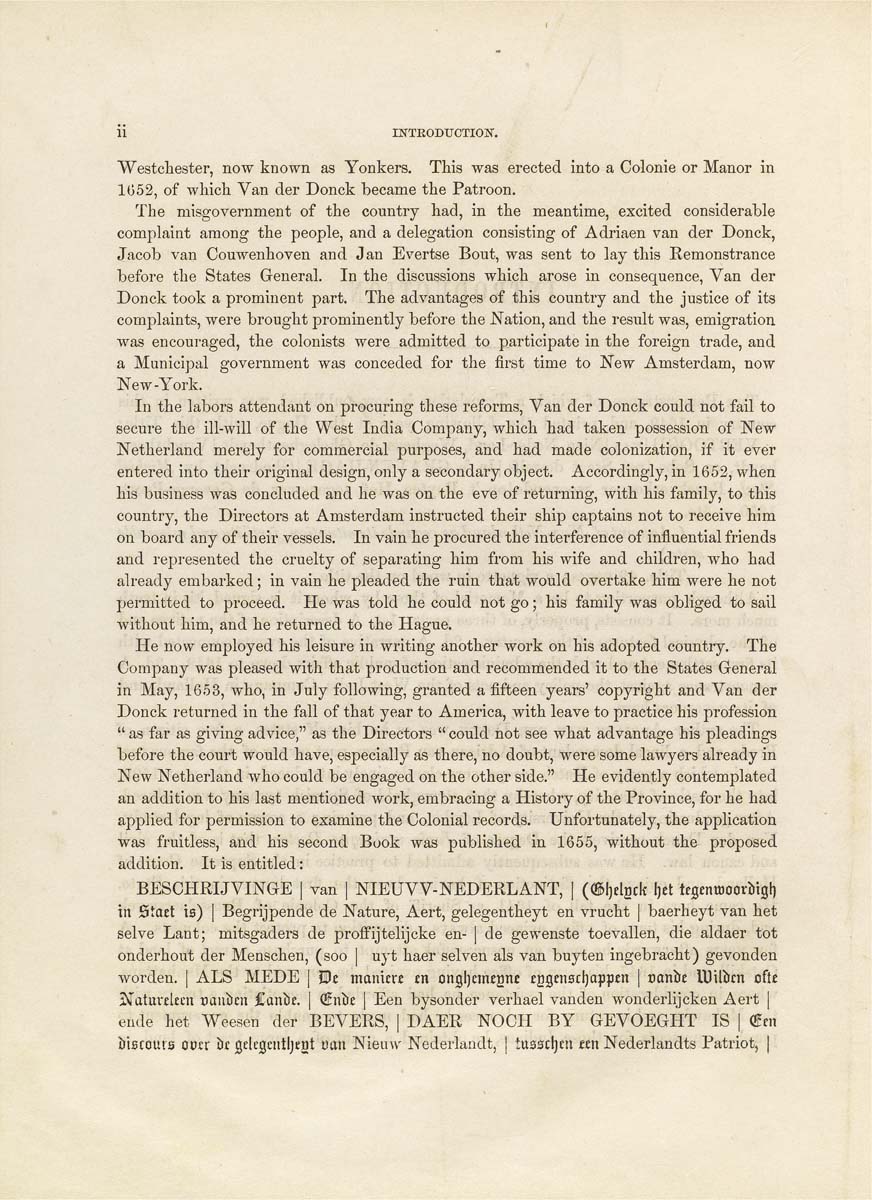11 INTEODUCTION.
"Westchester, now known as Yonkers. This was erected into a Colonic or Manor in
1652, of which Van der Donck became the Patroon.
The misgovernment of the country had, in the meantime, excited considerable
complaint among the people, and a delegation consisting of Adriaen van der Donck,
Jacob van Couwenhoven and Jan Evertse Bout, was sent to lay this Remonstrance
before the States General. In the discussions which arose in consequence, Van der
Donck took a prominent part. The advantages of this country and the justice of its
complaints, were brought prominently before the Nation, and the result was, emigration
was encouraged, the colonists were admitted to participate in the foreign trade, and
a Municipal government was conceded for the first time to New Amsterdam, now
New-York.
In the labors attendant on procuring these reforms, Van der Donck could not fail to
secure the ill-will of the West India Company, which had taken possession of New
Netherland merely for commercial purposes, and had made colonization, if it ever
entered into their original design, only a secondary object. Accordingly, in 1652, when
his business was concluded and he was on the eve of returning, with his family, to this
country, the Directors at Amsterdam instructed their ship captains not to receive him
on board any of their vessels. In vain he procured the interference of influential friends
and represented the cruelty of separating him from his wife and children, who had
already embarked; in vain he pleaded the ruin that would overtake him were he not
permitted to proceed. He was told he could not go; his family was obliged to sail
without him, and he returned to the Hague.
He now employed his leisure in writing another work on his adopted country. The
Company was pleased with that production and recommended it to the States General
in May, 1653, who, in July following, granted a fifteen years' copyright and Van der
Donck returned in the fall of that year to America, with leave to practice his profession
" as far as giving advice," as the Directors " could not see what advantage his pleadings
before the court would have, especially as there, no doubt, were some lawyers already in
New Netherland who could be engaged on the other side." He evidently contemplated
an addition to his last mentioned work, embracing a History of the Province, for he had
applied for permission to examine the Colonial records. Unfortunately, the application
was fruitless, and his second Book was published in 1655, without the proposed
addition. It is entitled:
BESCHRIJVINGE | van | NIEUVV-NEDERLANT, | ((g>\)ti^ck l)et tcgcntDoorbigl)
m Staet is) | Begrijpende de Nature, Aert, gelegentheyt en vrucht | baerheyt van het
selve Lant; mitsgaders de proffijtelijcke en- | de gewenste toevallen, die aldaer tot
onderhout der Menschen, (soo ] uyt haer selven als van buyten ingebracht) gevonden
worden. | ALS MEDE | JBt mamtxt zn ongljcmegnc t^%mstl}ap^m {vanbt VO\[bm oftt
^ainvdmx vmibm Canibe. | dnbt \ Een bysonder verhael vanden wonderlijcken Aert |
ende het Weesen der BEVERS, ] DAER NOCH BY GEVOEGHT IS | €m
blscouts Qvtx ht ^th^mtljmi van Nieuw Nederlandt, | ttt00cl3en ten Nederlandts Patriotj |
|








